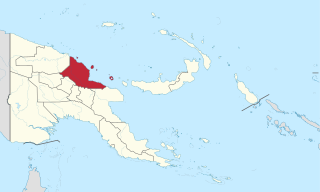
Madang is a province of Papua New Guinea. The province is on the northern coast of mainland Papua New Guinea and has many of the country's highest peaks, active volcanoes and its biggest mix of languages. The capital is the town of Madang.
The Brahman languages, Biyom and Tauya, form a subbranch of the Rai Coast branch of the Madang languages of Papua New Guinea. The family is named after the cattle station and town of Brahman, which lies between the territories of the two languages.
Bil Bil is an Austronesian language spoken by about 1200 people near Madang town, Madang Province, Papua New Guinea.
Matukar is an Austronesian language spoken by about 400 people near Madang town, Madang Province, Papua New Guinea. It is universally spoken by its ethnic group.
First Americans in the Arts (FAITA) is a non-profit organization based in Beverly Hills, California. According to its website, the organization was created "to recognize, honor and promote American Indian participation in the powerful arena of the entertainment industry, incorporating the areas of film, television, music and theater."

Madang Football Club, formerly known as Madang Flying Fox, Madang Niupetro Fox and, simply, Madang Fox, is a semi-professional Papua New Guinea football club, based in Madang.
The Rai Coast languages are a family of languages in the Madang stock of New Guinea.

Madang Road is an interchange station between lines 9 and 13 of the Shanghai Metro.
Mauwake (Mawake), or Ulingan, is a Papuan language of Madang Province, Papua New Guinea. It is spoken along the North coast of Madang province, which lies in the North-east of Papua New Guinea. Mauwake is principally spoken about 120 km northwest of Madang town, an area of about 100 square kilometres.
Gants, or as spelled in the language itself, Gaj, is a Madang language of Papua New Guinea.
Nekgini is one of the Finisterre languages of Papua New Guinea, spoken in a single village in Madang Province.
Bagupi is a nearly extinct Madang language of Papua New Guinea. The language is under pressure from neighboring large languages such as Garuh, and Tok Pisin, which is taking its toll. Spoken in the Madang Province of Papua New Guinea. Spoken at the headwaters of the Gogol River, west of Mabanob, northwest of Madang town. Very little is still known about this unique language situated in Papua New Guinea.
Mari, or Hop, is a minor Austronesian language of Madang Province, Papua New Guinea.
The South Adelbert or Southern Adelbert Range languages are a family of languages in the Madang stock of New Guinea.
In the Kitchen with Stefano Faita is a Canadian television cooking show, which aired from 2011 to 2014 on CBC Television. Hosted by Montreal chef and restaurateur Stefano Faita, the show featured Faita demonstrating recipes, predominantly but not exclusively associated with Italian and Québécois cuisines.

The Battle of Madang, fought between early February and late April 1944, was the break-out and pursuit phase of the Markham and Ramu Valley – Finisterre Range and Huon Peninsula campaigns, which were part of the wider New Guinea campaign of World War II. After overcoming the Japanese defences around Shaggy Ridge, the Australian forces descended the steep slopes of the Finisterre Range and pursued the withdrawing Japanese towards Bogadjim and then Madang on the north coast of New Guinea. There they linked up with US and Australian forces that had advanced along the coast from the Huon Peninsula, while the remnants of three Japanese divisions withdrew towards Wewak, where further fighting would take place throughout late 1944 and into 1945.

Madang, also known as Kampong Madang, is a neighbourhood in Bandar Seri Begawan, the capital of Brunei, as well as a village-level subdivision under Berakas 'B' of Brunei-Muara District. The head of its community is a ketua kampung or village head and the incumbent is Emran bin Ismail. The population is estimated to be 1,700. Madang is also a designated postcode area with the postcode BC3715.







